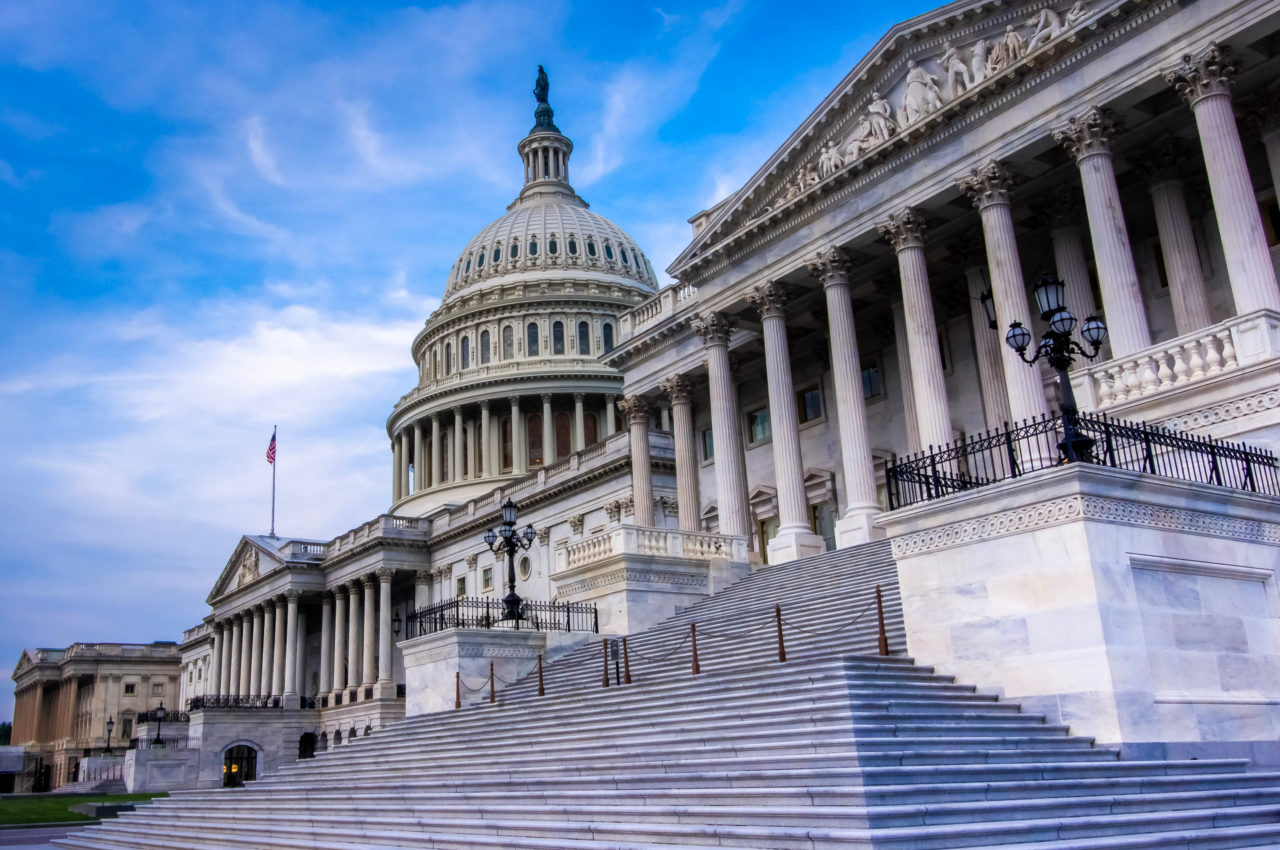Every month, we pick a few topics for exploration. The topics we select aren’t meant to cover every issue area facing the progressive community, but rather to give actionable advice on how to talk about key issue areas. Last month, we focused on the impeachment inquiry that had been recently launched in the House of Representatives. In this volume, we take a second look.
Key Takeaways:
- Since October, support for impeachment remains steady.
- There are both credible validators and compelling facts to make a strong case about Trump’s wrongdoing.
- An important next step is making it clear that Trump’s specific actions justify impeachment as laid out in the Constitution.
Most Americans continue to support impeachment.
The latest Navigator Research poll finds support for House Democrats’ impeachment inquiry steady since last month’s survey (conducted October 3-7), with 52% of Americans in favor of impeachment and 41% of Americans opposed. It was 52% in favor and 43% opposed last month.
There is still a segment of “soft” opposition and undecideds. While support for impeachment holds firm, there remains an additional segment of Americans not yet convinced. Eight percent (8%) are undecided, and nearly half of impeachment opponents (18% of the public) oppose impeachment currently but do NOT agree with Trump that he did nothing wrong (just 23% of Americans offer the president full exoneration). This 26% – we call them “Impeachment Skeptics” – include the following groups:
- 8% who are undecided about whether to impeach Trump;
- 12% who believe he may have done something wrong, but are not ready to say it justifies impeachment;
- 4% who oppose impeachment despite believing Trump committed impeachable offenses, and would prefer to wait for the next election to let the public weigh in; and,
- 2% who did not offer a reasoning for opposing impeachment.
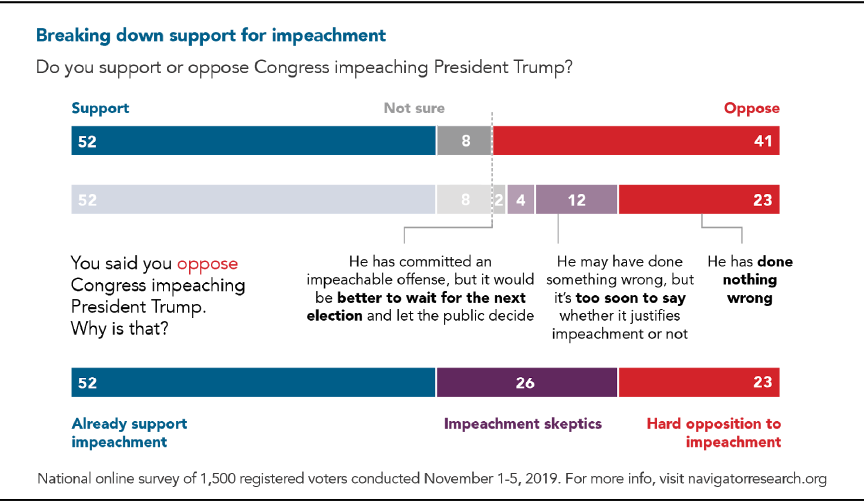
Given Democrats already overwhelmingly support impeachment, the conflicted Skeptics are a disproportionately Republican-leaning group. Fifty-one percent (51%) identify as Republicans, 27% as Democrats and 22% as purely independent. They also generally approve of the president’s overall job performance (56% approve, 38% disapprove), particularly his handling of the economy (65% approve, 26% disapprove).
One warning sign for progressives is Trump’s process arguments may be working on some of these Skeptics.
- More are hearing about the process in general (55% have been hearing “a lot” about “an impeachment inquiry for Donald Trump”) than are hearing about Trump withholding military aid to get Ukraine to help his reelection (just 30% have been hearing “a lot” about this).
- Skeptics are also particularly likely to say the process has been unfair (48%) rather than fair (18%), though the broader public takes the opposite view (47% fair, 36% unfair).
- Skeptics are also disproportionately already exhausted and confused by the proceedings so far. They are not as hopeful as impeachment supporters or as angry as opponents.
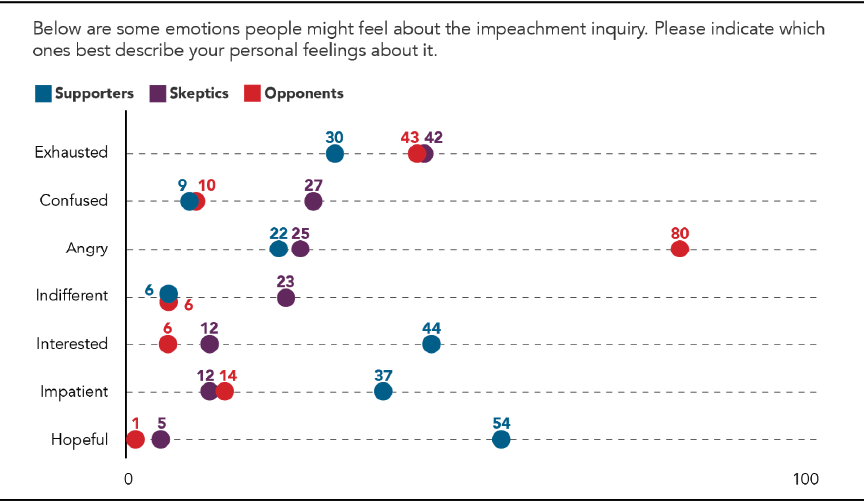
Skeptics are a challenging group, and many of them may be resistant to shifting from their current opposition to impeachment. However, many are also truly conflicted about Trump’s actions. When presented with arguments made by supporters of impeachment (presented later in this memo), roughly half (49%) of Skeptics find at least one argument for impeachment convincing.
Despite what some might think, a debate about the rule of law is fundamentally good terrain for progressives when Trump is the foil. When compared to President Trump, Democrats in Congress are more trusted on “the rule of law” by 14 points, with 49% of respondents trusting Democrats more compared to 35% who trust Trump more. On “protecting law and order,” 46% of Americans trust Democrats more, while 39% trust Trump more. However, the advantage is narrower when Democrats are pitted against Republicans in Congress – President Trump is uniquely flawed on this metric.
More suspect Trump of wrongdoing than support impeachment.
There remains room for impeachment support to increase.
Sixty-two percent (62%) believe Donald Trump definitely or probably has abused his power as president and 54% that he has definitely or probably committed a crime as president.
Initially, by 14 points (46% to 32%), respondents say the facts of the case “point to clear wrongdoing by Trump that is worthy of impeachment” rather than exonerate Trump, with 22% unsure. After hearing more about the pro-impeachment case, the undecided share drops to 14%, and more see impeachable conduct (54% to 32%). The movement, mostly coming from those initially uncertain about the facts, underscores the necessity of describing Trump’s conduct and why it is impeachable.
Two tasks for supporters of impeachment: Elevating the right validators and emphasizing the right facts.
Task 1: Elevate validators who are seen as clearly putting the national interest ahead of partisan politics.
Military veterans are credible story-tellers of Trump’s actions relating to Ukraine. Advocates for impeachment can benefit from emphasizing veterans like Army lieutenant Alexander Vindman and Vietnam veteran Bill Taylor who continue to corroborate the basic story at the center of the impeachment inquiry. Addressing reluctant audiences with an emphasis on these speakers’ military backgrounds, non-partisan diplomatic or national security experience, and bipartisan credentials (including their appointment by Trump in the first place) can also be persuasive.
On the other hand, framing witnesses as having more complicated and partisan backstories – like appointees who turned on Trump, or those “appointed by Obama” but confirmed in a bipartisan way – is less effective for telling this story. The public appears less interested in the political “gotcha” moments of people switching sides than they are in the credibility of veterans and public servants who demonstrate their commitment to country over party.
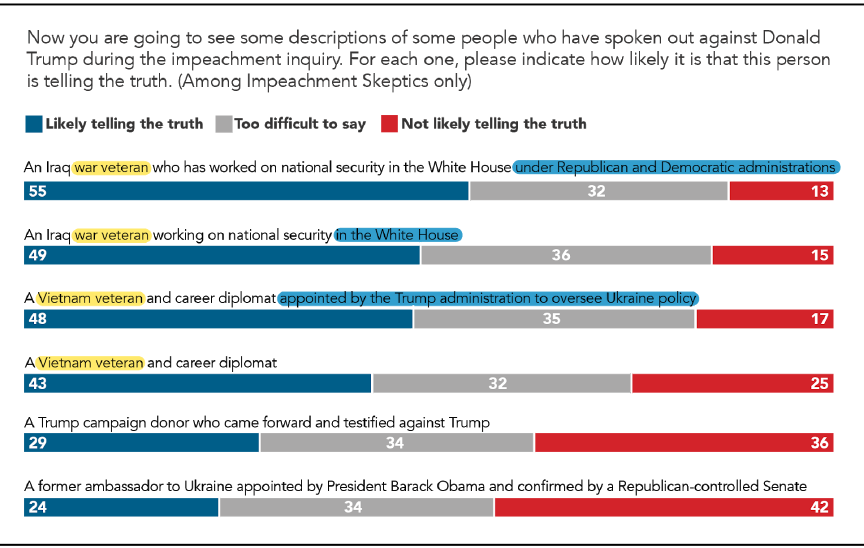
Task 2: Restate the basic facts and tie it to the Constitution. One especially effective message frames Trump’s actions as the “solicitation of a bribe.”
Navigator introduced respondents to various specific facts and statements about Donald Trump’s behavior relating to Ukraine and investigating Joe Biden, and asked them to rate how weak or strong of a case each makes for impeachment on its own.
Messaging focused on Trump’s solicitation of a bribe from the Ukrainian president is especially resonant and should be front and center. Skeptics are more likely to say this builds a strong case for impeachment than any of the other pieces of evidence presented. This statement explains clearly what Trump did, casts it as more than merely asking for foreign assistance, and shows it was a direct violation of something listed in the Constitution as an impeachable offense.
Other statements focused on subpoenas and obstruction of justice, the government whistleblower, and removal of key passages from the transcript of the phone call with the Ukrainian president are less effective. One of the least persuasive statements cites diplomat Bill Taylor’s claim that there was a “quid pro quo.”
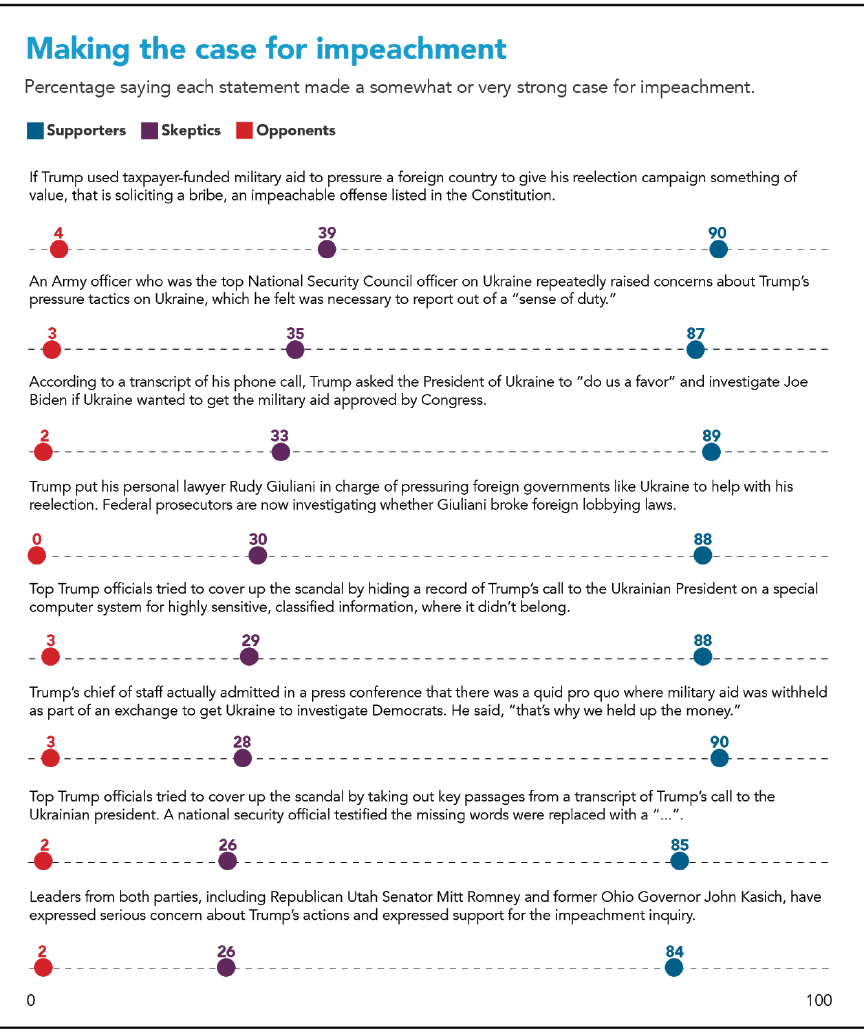
Ladder up to impeachment: State clearly what Trump did, and why it is impeachable.
Advocates for impeachment should focus on Trump’s use of taxpayer-funded military aid to get something for himself and make a clear connection to the behavior being both legally wrong and impeachable. In a separate thematic test, describing Trump’s actions as a violation of the Constitution by soliciting a bribe again resonates, as do arguments that Trump abused his power and broke the law. These same three arguments were also most effective among the group of respondents most likely to change their mind about whether the facts of the case were on Trump’s side or not.
“Abuse of power” remains the most compelling shorthand, with 29% of Skeptics saying it describes what most troubles them about Trump’s behavior. This places it ahead of “acting like he is above the law” (21%), “endangered national security” (19%), “bribery” (19%), and “corruption” (18%).
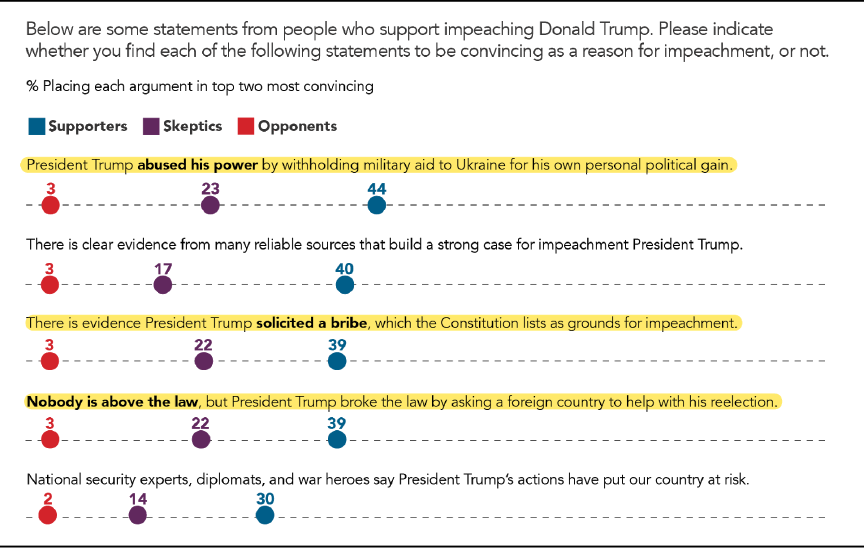
The bottom line: In order to move the opinions of people who start out undecided or believing that Trump did something wrong, but not necessarily impeachable, advocates have to explicitly connect the dots between actions, crime, and the Constitution.
